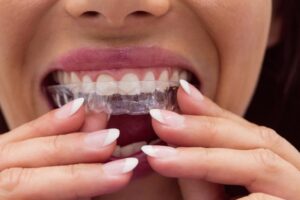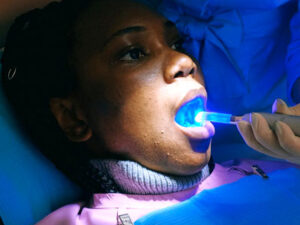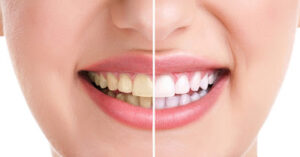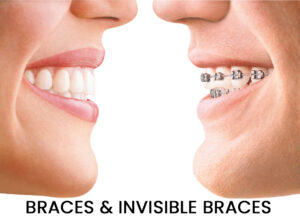
Sensitive teeth mean pain or discomfort in the teeth. It is in response to certain stimuli, like hot or cold temperatures. It can be a temporary or chronic issue and can impact one tooth, multiple teeth, or all of the teeth of the same person.
What are sensitive teeth?
Sensitive teeth are caused when the underlying layer of your teeth, dentin, is exposed due to receding gum tissue. The roots, which are uncovered by hard enamel, contain many small tubes leading to the center of the tooth. These dentinal tubules enable stimuli—for instance, hot, cold, or sweet food varieties—to reach the nerve in your tooth, causing the pain you are experiencing.
Causes:
Brushing with stiff bristles
Sometimes, the delicate teeth come from brushing too hard or using a toothbrush with stiff bristles. After some time, you can wear out the protective layers of your teeth and uncover microscopic hollow tubes or channels that prompt your dental nerves. When exposed to outrageous temperatures or too acidic or sticky foods, this can cause dental sensitivity and discomfort. The simplest solution is to use a soft-bristled toothbrush.
Eating Acidic Foods:
If the pathways to your nerves are uncovered, acidic foods like tomato sauce, lemon, grapefruit, kiwi, and pickles might cause pain. Avoiding such foods can help you avoid dental discomfort.
A Tooth Crusher
In fact, tooth enamel is the hardest substance present in your body, and grinding your teeth can wear it out. By doing this, the center layer of the tooth is exposed, which holds the hollow tubes that lead to your nerves.
Use whitening toothpaste.
The majority of toothpaste manufacturers add whitening chemicals to their formula. If your toothpaste contains bleach, consider changing to one that doesn’t.
Reliant on mouthwashes.
Similar to whitening toothpaste, a few types of mouthwash also contain alcohol and other chemicals that can make your teeth more sensitive. Instead, try to flush with neutral fluoride or just avoid the flushing and be more diligent in flossing and brushing.
Gum disease:
Receding gums, which are more common with age (particularly if you have not been monitoring your dental health), can lead to sensitive teeth. Assuming that gum disease or gingivitis is the issue, your dentist will devise a plan to treat the basic disease and may also recommend a system to seal your teeth.
Excessive Plaque:
The objective of flossing and brushing is to eliminate plaque that forms after eating. Excessive plaque development can prompt tooth enamel wear. Once more, your teeth might turn out to be more sensitive as they lose the protection given by the enamel. The solution is to practice good day-to-day dental care and visit your dentist for cleanings at regular intervals or more often as possible.
A Dental Procedure
It is normal to experience some sensitivity after root canal treatment, extraction, or crown placement. Assuming that the side effects don’t disappear after a short time, schedule one more visit to your best dentist in AS Rao Nagar, as this could be an indication of contamination.
Cracked Tooth:
A chipped or cracked tooth can cause pain that goes past sensitive teeth. Your dentist will need to assess your teeth and decide on the right treatment, like duplicating or extraction.
Decomposition of Fillings on the Edges:
As we age, fillings can weaken and break or leak around the edges. It’s easy for bacteria to grow in these tiny crevices, causing acid buildup and enamel breakdown. If you notice any kind of sensitivity in your teeth between visits, make an appointment with your dentist; in most cases, the fillings can be easily replaced.
Diagnosis:
If you experience sensitive teeth, consult your dental doctor. They can analyze your oral health and search for potential issues like cavities, loose fillings, or receding gums that could be causing the sensitivity.
Your dental doctor will do this during your normal dental cleaning. They will clean your teeth and do a visual assessment. They can touch your teeth using dental instruments to check for sensitivity, and they can also suggest an x-ray of your teeth to rule out causes such as cavities.
Treatment:
Desensitizing toothpaste: After a series of research, desensitizing toothpaste help block the pain related to sensitive teeth. There are a variety of nonprescription items. Ask your dental doctor which product is best for your dental care.
Your dentist might apply fluoride to sensitive spaces in your teeth to strengthen tooth enamel and reduce pain. He or she may also suggest the use of fluoride at home, applied by means of a personalized tray.
Desensitization or Bonding: Sometimes exposed root surfaces can be treated by applying an adhesive resin to sensitive root surfaces. Local anesthesia may be required.
A Careful Gum Transplant: If your tooth root has lost gum tissue, a limited quantity of gum tissue can also be taken from your mouth and attached to the affected site. This will protect the exposed roots and reduce sensitivity.
If your sensitive teeth cause serious pain and medicines are ineffective, your dentist can suggest a root canal treatment used to treat issues with the soft core of the tooth. Although this might appear to be a significant treatment, it is viewed as the best way to eliminate sensitive teeth.
Avoidance
People can help with securing their tooth enamel and preventing sensitive teeth by:
- Brush your teeth two times every day with fluoride toothpaste.
- Floss once per day.
- Take breaks to allow your teeth to whiten.
- Limit the consumption of sugary, starchy, and acidic foods.
- Consume alcohol in moderation.
- Wear a mouth guard to prevent grinding and clenching of your teeth.
- Visit a dentist regularly.
- Quit smoking













